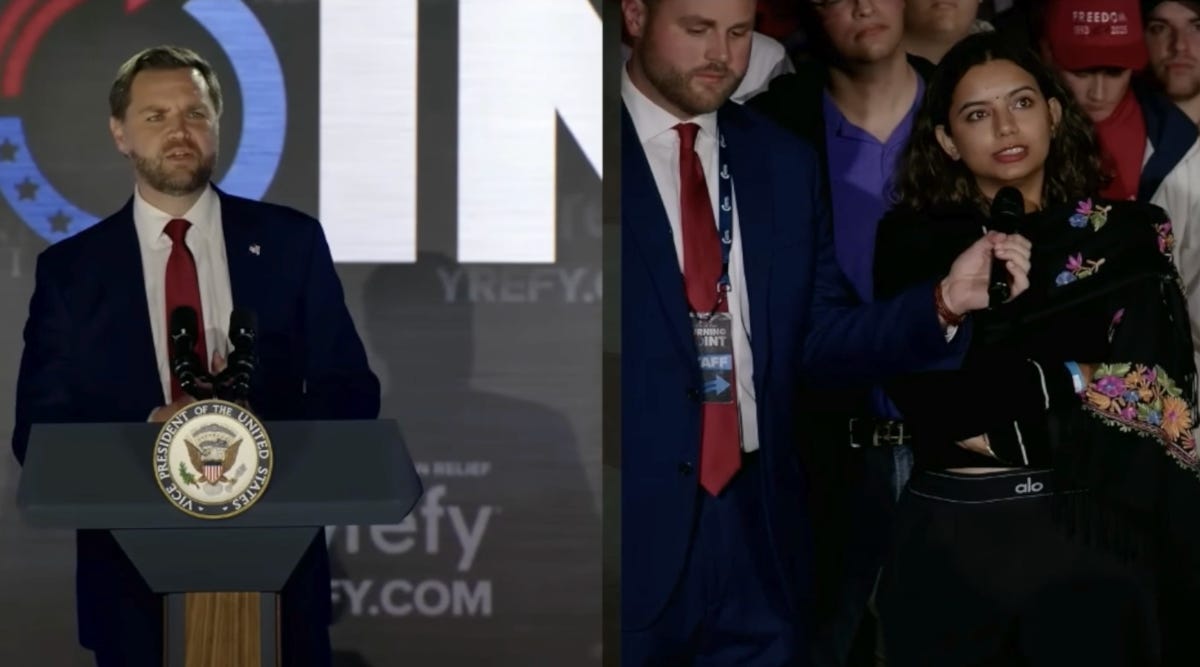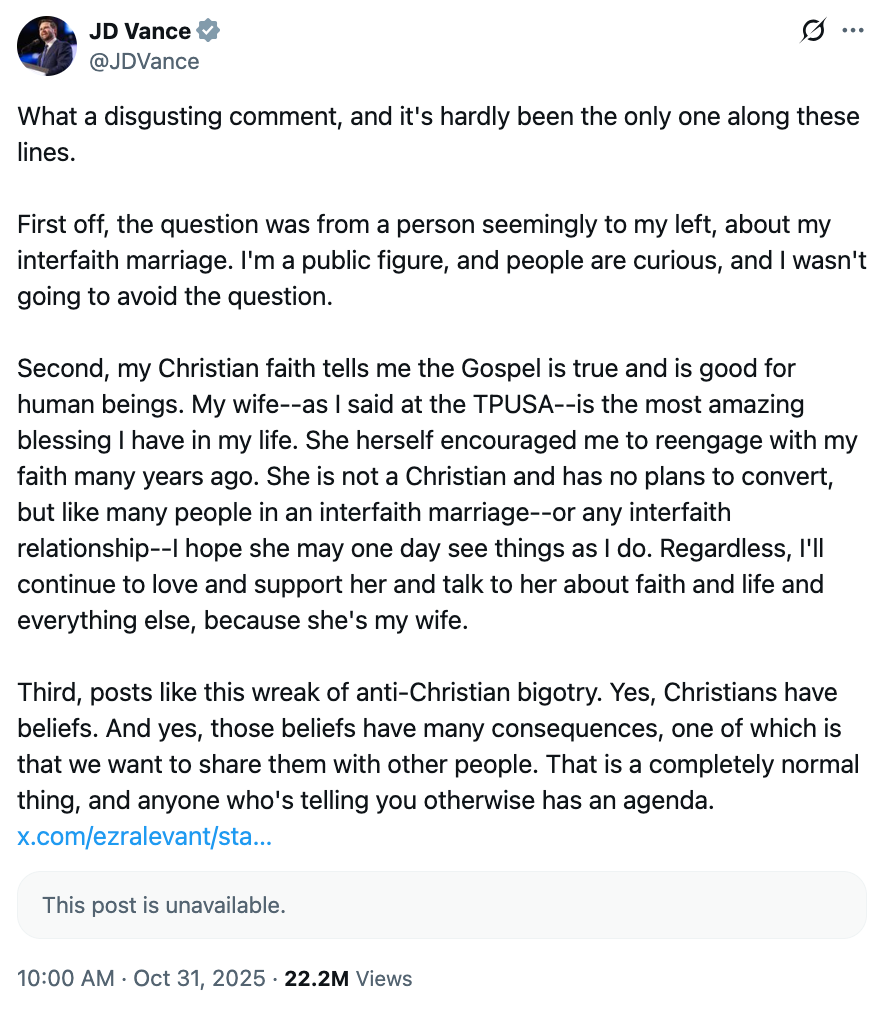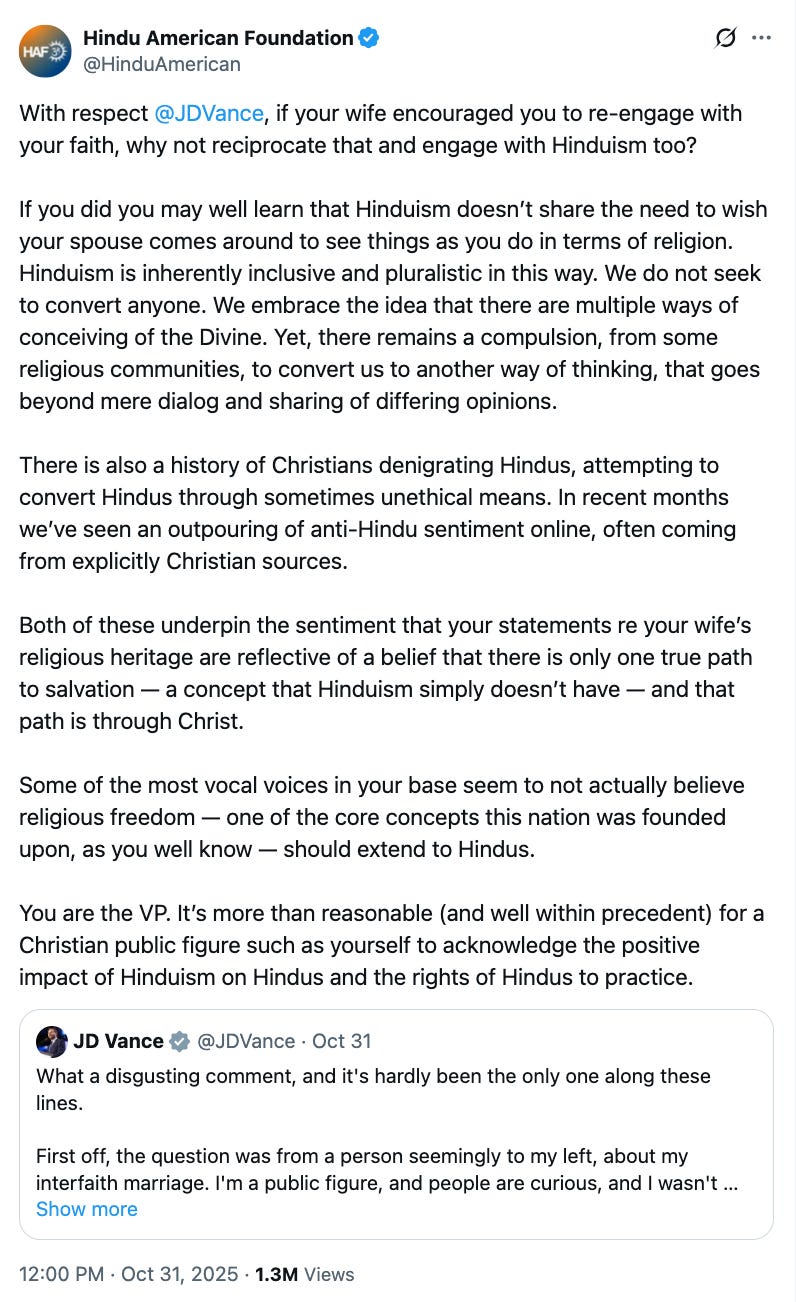JD Vance wants his Hindu wife to convert. It’s Christian Nationalism: Home Edition.
Raising his kids Christian while hoping his wife abandons Hinduism shows how little the vice president respects religious pluralism
This newsletter is free and goes out to over 23,000 subscribers, but it’s only able to sustain itself due to the support I receive from a small percentage of regular readers. Would you please consider becoming one of those supporters? You can use the button below to subscribe or use my usual Patreon page!
Last week, Vice President J.D. Vance hosted a Q&A session at the University of Mississippi during which a student asked him how he handled his non-traditional marriage.
Vance is Catholic and his wife Usha is Hindu, and the student wanted to know how they made that work… how did they raise their kids not to think one was better than the other?
What I want to ask is: You are married to a woman who is not Christian. In her Wikipedia—I mean, I just looked that up, I wanted to know what her faith was, I didn’t know this before—but she still calls herself Hindu.
You are raising two kids—three kids—in inter-cultural, racial, religious household. How are you maintaining, or how are you teaching your kids, not to keep your religion ahead of their mother’s religion? Or how are you teaching them that your kind—their Dad kind, who got here just few years… or few decades ago—is different or is better, than your mom’s kind who got here just a generation before?
It was a fair question! Vance is a Christian Nationalist who has spent his time in office promoting right-wing Christians who pretend their people are being persecuted—an obvious lie—all while denigrating people who aren’t Christian. We know he believed Christians are better than non-Christians because his actions and words constantly point in that direction.
Was that also the case at home?
At first, his answer wasn’t all that unusual. He suggested that all couples with different faiths just needed to work through their differences on their own. He respected his wife, she respected him, etc. He didn’t get into the theology of it all.
But he added that he did hope his wife would eventually convert.
Now, you asked a personal question about our interfaith household. And yes, my wife did not grow up Christian. I think it’s fair to say that she grew up in a Hindu family, but not in a particularly religious family in either direction.
In fact, when I met my wife, we were both… I would consider myself an agnostic or an atheist, and that’s what I think she would have considered herself as well.
You know, everybody has to come to their own arrangement here. The way that we’ve come to our arrangement is, she’s my best friend, we talk to each other about this stuff.
So we decided to raise our kids Christian. Our two oldest kids who go to school, they go to a Christian school. Our eight-year-old did his first communion about a year ago. That’s the way that we have come to our arrangement.
[To audience:] Thank you. My eight-year-old was also very proud of his first communion. Thank you guys. I’ll tell him that Ole Miss wishes him the best.
But I think everybody has to have this own conversation when you’re in a marriage. I mean, it’s true for friends of mine who are in Protestant and Catholic marriages, friends of mine who are in atheist and Christian marriages, you just got to talk to—the only advice I can give is you’ve just got to talk to the person that God has put you with, and you’ve got to make those decisions as a family unit. For us, it works out.
Now, most Sundays Usha will come with me to church. As I’ve told her, and I’ve said publicly, and I’ll say now in front of 10,000 of my closest friends, do I hope eventually that she is somehow moved by the same thing that I was moved in by church? Yeah. I honestly do wish that. Because I believe in the Christian gospel, and I hope eventually my wife comes to see it the same way.
But if she doesn’t, then God says, “Everybody has free will.” And so, that doesn’t cause a problem for me. That’s something you work out with your friends, with your family, with the person that you love.
Again, one of the most important Christian principles is that you respect free will. Usha is closer to the priest who baptized me than maybe I am. They talk about this stuff. My attitude is, you figure this stuff out as a family, and you trust in God to have a plan, and you try to follow it as best as you can. And that’s what I try to do.
On the surface, that sounds like a fine answer. But there are some gaping holes on that logic. Even if neither of them was particularly religious when they met, both have leaned into their faith identities now that they’re public figures.
Vance said they decided to “raise our kids Christian.” Why? Why not Hindu? He didn’t answer that. He just said “That’s the way that we have come to our arrangement.” As if the husband said it, so that’s the final answer.
He said he wanted his wife to eventually convert. Is there any chance he’s ever going to convert to Hinduism? Probably not. So why is he thinking she’ll change her mind, but there’s no indication he’s even open to changing his?
And just because she has free will, Vance ignored the obvious question: If his wife isn’t Christian, he would likely believe she’s spending all of eternity in Hell. How does that not “cause a problem” for him?
Vance never answered the relevant questions, choosing instead to act like this was all about mutual respect… even though the end result is that his religion takes priority in their family and there’s no indication her religion ever gets taken seriously at all.
All of this is happening while the Trump administration is terrorizing communities of color—not just criminals—and making it very clear that white people (most of whom are Christian) will always receive preferential treatment no matter what this country says about religious freedom.
When he was later criticized for throwing his wife’s faith “under the bus,” Vance predictably responded with indignation, making the accusation that criticisms like these “wreak of anti-Christian bigotry”:
To be clear, there’s nothing bigoted about asking a leader in this racist, fascist administration on how specifically he respects his brown wife’s non-Christian faith.
He could have just said they’re not particularly religious so their beliefs don’t matter as much as their shared values, but that would infuriate his white evangelical supporters. He could have said he respects his wife’s faith, so their children learn the beliefs of both, and eventually they’ll have to make their own decision, but the parents will respect them either way… but that, too, would have upset his base.
So instead he tried to have it both ways, pleasing nobody.
Even the Hindu American Foundation, which has praised Republicans who offer the mildest of platitudes about things like Diwali thereby downplaying their party’s racist policies and voter base, wasn’t impressed with anything Vance said.
With respect @JDVance, if your wife encouraged you to re-engage with your faith, why not reciprocate that and engage with Hinduism too?
If you did you may well learn that Hinduism doesn’t share the need to wish your spouse comes around to see things as you do in terms of religion. Hinduism is inherently inclusive and pluralistic in this way. We do not seek to convert anyone. We embrace the idea that there are multiple ways of conceiving of the Divine. Yet, there remains a compulsion, from some religious communities, to convert us to another way of thinking, that goes beyond mere dialog and sharing of differing opinions.
There is also a history of Christians denigrating Hindus, attempting to convert Hindus through sometimes unethical means. In recent months we’ve seen an outpouring of anti-Hindu sentiment online, often coming from explicitly Christian sources.
Both of these underpin the sentiment that your statements re your wife’s religious heritage are reflective of a belief that there is only one true path to salvation — a concept that Hinduism simply doesn’t have — and that path is through Christ.
Some of the most vocal voices in your base seem to not actually believe religious freedom — one of the core concepts this nation was founded upon, as you well know — should extend to Hindus.
You are the VP. It’s more than reasonable (and well within precedent) for a Christian public figure such as yourself to acknowledge the positive impact of Hinduism on Hindus and the rights of Hindus to practice.
But it’s not like his wife has a better answer to this either. During a recent interview, look at how she described her children learning about her own faith:
In a June interview on Meghan McCain’s podcast, Mrs. Vance said that while the children went to Catholic school, they could choose whether they wanted to be baptized.
“The kids know that I’m not Catholic, and they have plenty of access to the Hindu tradition from books that we give them, to things that we show them, to the visit recently to India and some of the religious elements of that visit,” she said. “So it is a part of their lives and they know many practicing Hindus as a part of their lives in their own family.”
Visiting India and going to temples is like visiting Europe and going to castles. You do it because that’s what you do when you’re there. The former doesn’t make you religious and the latter doesn’t make you royalty. Having access to books about the faith doesn’t mean the kids are reading them. And having Indian parents doesn’t necessarily change that either.
In other words, she’s also playing up her own faith while, in practice, it’s obvious it’s not that meaningful for her or her family. Which would be fine if she just came out and said that! But admitting religion isn’t a huge deal in their family, which is why their religious differences are irrelevant, wouldn’t play well among Republicans. (Which is ironic since Donald Trump himself, no matter what label he uses to lie with and no matter what he says in any speech, strikes no one as religious. And reporters aren’t even bothering to ask Melania Trump about her faith because no one expects her to say anything of value on that topic. She’s Catholic in case anyone is interested—which no one is.)
My friend Dale McGowan once wrote a book called In Faith and In Doubt (affiliate link) about these kinds of interfaith marriages. When I asked him what he made of Vance’s comments, he said it made “perfect sense from the traditional Christian perspective” in the sense that it was exclusionary.
If he really believes it, it makes sense to hope she jumps into the boat. But it certainly violates the foundational requirement of a successful interfaith marriage, and does so with total disrespect for the other partner.
The question of how to make Catholic-Hindu marriages work is also a sore subject for many Indians—not Usha Vance, clearly—given how Christians have a history of colonizing and converting people in their country.
Vance’s answer comes while other Indian Republicans like Vivek Ramaswamy, who’s running to become governor of Ohio, and FBI Director Kash Patel are constantly receiving racist insults from the same MAGA base that JD Vance is trying to appeal to by downplaying how much influence his Indian wife’s religion has over their family.
As Khyati Y. Joshi, who’s also Hindu, wrote for Religion News Service, Vance’s response sent a very clear message about what being American truly means to him:
When a sitting vice president makes this kind of statement at a political rally, that private conviction is amplified through the power of public office. It reverberates through a culture already grappling with whether Christianity alone defines morality, patriotism and family values. It reinforces an old and persistent story about belonging in America: That wholeness, even love itself, ultimately depends on coming to Christ.
Americans who are Hindu, Jewish, Sikh, Buddhist and Muslim will hear Vance’s hope as a public reminder that only one faith is really American.
There’s another aspect of Vance’s response that’s also telling: When it comes to his wife who, on paper, appears to be so different from him in some important ways, Vance stressed how they work through their differences toward their shared goals (of raising their children, helping Trump destroy our democracy, etc).
But when it comes to Democrats, Vance has no interest in working through anything with them. He lies about them, he demonizes them, he treats them as if they’re not real Americans. It’s another reason why his answer rang so hollow. We know what Vance is like because we see what he does—none of it makes him look good—but he wants everyone to believe he’s a completely different, thoughtful, respectful individual in private.
Vance’s answer, then, wasn’t just about his private life. It was a public confession of hierarchy. His polite words about respecting “free will” were papering over his own worldview that still places Christianity firmly above everything else. To “hope” your wife converts isn’t an expression of affection or respect; it’s a desire for domination. How much respect can you really have for a partner whom you still think, years into a marriage, is lacking something vital to you?
That matters, not only because Vance occupies one of the highest offices in the country, but because his attitude mirrors the same Christian Nationalist logic driving much of his party’s politics. When he dismisses Hinduism as something his wife will eventually “see” through, he echoes a broader message about who belongs in America and who must be assimilated. The fact that his family’s “arrangement” involves the children being raised Christian isn’t a compromise; it’s a quiet reinforcement of the idea that Christianity is the baseline for legitimacy, that all other faiths exist in the shadow of the cross.
He doesn’t see Hinduism as a living faith equal to his own. He sees it as some quaint cultural artifact. It sends a clear message to the millions of non-Christians in America that their beliefs are tolerated by the ruling party only if they pose no challenge to Christian hegemony. It’s easy to pretend you care about religious pluralism when your own wife prioritizes your Christian beliefs.
Even in the supposed sanctity of his marriage, Vance can’t seem to imagine a union not centered around his own beliefs.




𝑇ℎ𝑒𝑟𝑒 𝑖𝑠 𝑎𝑙𝑠𝑜 𝑎 ℎ𝑖𝑠𝑡𝑜𝑟𝑦 𝑜𝑓 𝐶ℎ𝑟𝑖𝑠𝑡𝑖𝑎𝑛𝑠 𝑑𝑒𝑛𝑖𝑔𝑟𝑎𝑡𝑖𝑛𝑔 𝐻𝑖𝑛𝑑𝑢𝑠, 𝑎𝑡𝑡𝑒𝑚𝑝𝑡𝑖𝑛𝑔 𝑡𝑜 𝑐𝑜𝑛𝑣𝑒𝑟𝑡 𝐻𝑖𝑛𝑑𝑢𝑠 𝑡ℎ𝑟𝑜𝑢𝑔ℎ 𝑠𝑜𝑚𝑒𝑡𝑖𝑚𝑒𝑠 𝑢𝑛𝑒𝑡ℎ𝑖𝑐𝑎𝑙 𝑚𝑒𝑎𝑛𝑠.
It seems to me that one of those unethical means is marrying a Hindu woman and demanding the children be raised Christian and pressuring her to convert. But why should I expect ethical behavior from a Christian Nazionalist.
I get the sense Vance, like a lot of Christians, appears to think he proves his own point when he gets people to go to his church. The number of people who believe something, no matter how fervently, does not render that belief true. As happens so often with Christians, Vance's performative religiosity doesn't exactly qualify him as moral, and makes a compelling case for atheism.